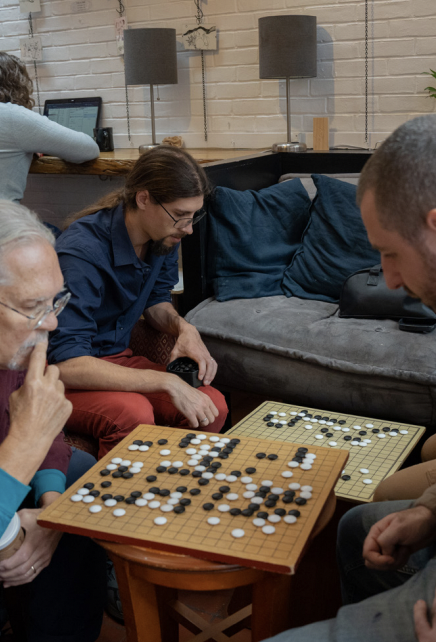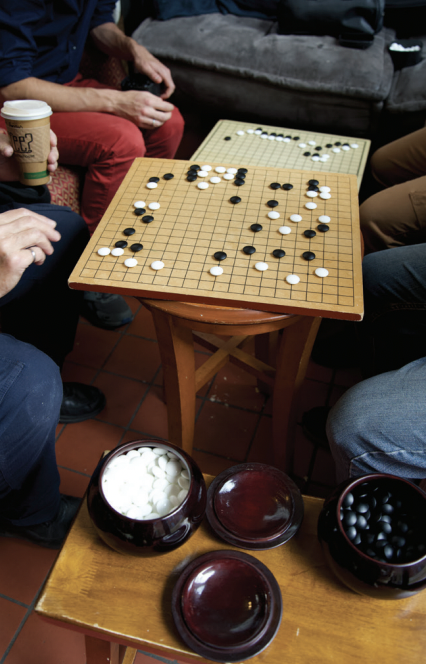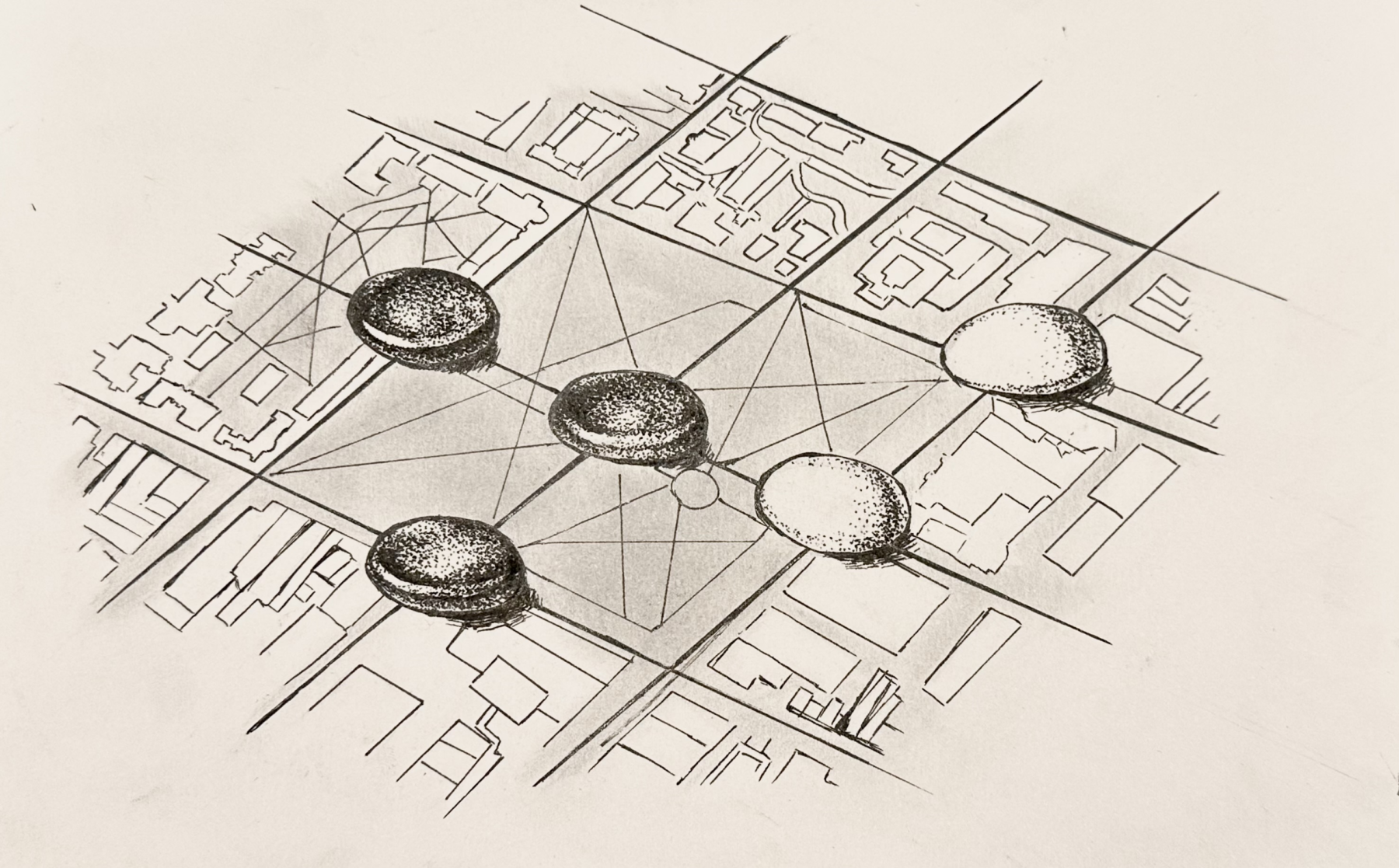At first, I thought I was on the wrong floor of the library. I had just gotten off a phone call with my parents. Their surprise at the existence of a Go Club in New Haven heightened my excitement to uncover its existence for myself. I had anticipated wooden Go tables sprawled out across an open floor in a small, closed-off section of the library. My parents teased that I would be out of place. Baduk—the Korean name for Go—is an old person’s game.

Perhaps there would be rice crackers and dried squid, and I would have to be prepared to introduce myself in Korean. I was worried the elders might find my questions bothersome; the church elders I knew weren’t always fond of gameplay interruptions. But the prospect of meeting Korean American elders in New Haven excited me nonetheless.
The Korean American Students at Yale newsletter introduced me to the New Haven Go Club. Hearing about the club prompted me to trace back the spaces I associate with Go. In celebration of Lunar New Year, the Korean American church in my hometown transforms its cafeteria into a hall brimming with Korean dishes and snacks, church members wearing hanboks, and a large spread of traditional games. Lining one side of the cafeteria, pairs of Korean elders play long, silent matches of Baduk against the backdrop of lively festivities. A similar sight awaits at the Korean sauna: in the recreational area, next to the chess boards, are Baduk boards with small bowls of black and white stones placed neatly next to them.
For me, Baduk is an emblem of the diasporic Asian community, finding its way into churches on Long Island, saunas in New Jersey, and libraries in New Haven. It embodies the post-colonial, diasporic Korean experience in its very essence: a strategy game of conquest and capture, sacrifice and liberty, life and death.
As I descended the New Haven Free Public Library stairs, I saw no elders or young Korean students. It was all white people. But the Go boards—with their sure grids and black and white stones—were unmistakable. Four people hunched around a long white folding table. And Quentin Bateux-Mocquard was one of them, just about to start his first match.
Bateux-Mocquard, the club founder and a postdoctoral researcher at Yale, enjoys abstract games and logic: a reflection of his background in computer science. He first heard of Go as a boy through Hikaru no Go, a manga about a boy possessed by a Go player from Japan’s Heian period. But it wasn’t until 2015, when AlphaGo became the first Go computer program to defeat a professional player, that Bateux-Mocquard revisited Go as an adult. That technological feat intrigued Bateux-Mocquard. He began playing Go through local clubs across France.
Bateux-Mocquard, with a smiley demeanor and an eagerness to teach, walked me through my first game of Go. I had never played before and found it funny that a white man in New Haven was the first one to teach me. I don’t have a talent for abstract strategy games and struggled to foresee obvious formations and predict Bateux-Mocquard’s moves. But Bateux-Mocquard is especially seasoned in teaching total beginners. He taught me all the basic components and strategies. The term “Atari,” for example, refers to when a stone or a group of stones can be captured on the next move by the opponent—similar to a check in chess. I found myself in Atari quite frequently.

Next to us sat John Grisafi. He was more soft-spoken than Bateux-Mocquard but sometimes looked up from his own game to chime in with advice on cleaner ways to play. Grisafi is a fifth-year graduate student at Yale with a focus in Asian religions and has previously researched U.S. military occupations in South Korea. His research, as well his marriage to a Korean person, drove him to explore Korean hobbies. “I was exposed to the game after initially being exposed to Janggi,” he says as he deliberates his next move, talking through his turn. Janggi is a chess variant played in Korea on a 9 inch by 10 inch gameboard. Grisafi owns a board with Janggi layouts on one side and Go on the other. After a year and a half of playing the Janggi board, he decided to flip it over and try the Go side.
Grisafi has helped Bateux-Mocquard advertise the club by reaching out to Yale student organizations like the Ancient Chinese Traditions Club. Both men are committed to growing the club for the same reason: personal connection.
Bateux-Mocquard’s motivation for starting the club in March of this year grew out of a frustration with the lack of connection in playing Go online. “I need the balance of being able to actually see people and play and chat and play against a lot of different levels, and teach sometimes.” He adds that seeing people face-to-face motivates him.
Grisafi, who started playing through apps, also acknowledges the merit of playing in-person: “I was in Daegu, Korea, and I was at a park and saw older men playing. It’s seeing people play it in person that really rekindles your interest in doing so.”
Halfway into the club meeting, Justin Kim arrived, a newcomer to the Go club and a Korean American graduate student at Yale. He was the only other Asian person in attendance and had joined in interest of playing in person. Kim, who grew up playing with his brother, says, “It makes it much more human…it’s nice to talk to someone and chat before and after or just have small talk during it.”
Kim adds that there is an added layer of excitement that comes with playing against real people—it heightens the stakes. He recalls his experiences of playing against chess hustlers in New York City, where putting money down made him even more exhilarated to play. Similarly, the dynamic of a Go game transforms when your opponent is sitting right in front of you, even with no money involved.
Teaching, watching, and chatting comprised the ethos of the members’ interactions at the club meeting. Before a game, members would negotiate how to even the playing field, often playing someone with more or less experience. At the end of a game, players would deliberate moves they should’ve taken and exchange analyses of the other’s game. Throughout the games, members also shared anime recommendations and bonded over their love for Californian cities. For a club I expected to be a silent, meditative escape from the rainy weather, the session was brimming with jokes—the club was asked to quiet down three times by library personnel. By the end of the session, all three of the remaining members huddled around Kim and Bateux-Mocquard’s game, watching intently in mesmerization and offering lively commentary.
I did not leave the club meeting any better at Baduk than I did walking in. The terms, ironically, still feel foreign to me—atari, liberties, ladders. I cannot inherit Baduk: my parents and cousins in America do not play, and the ones that might live fifteen hours away. And yet I can walk five minutes to the New Haven Free Public Library, where a small piece of this uninherited culture is nestled tightly into a community that handles it with care.

-Christina Lee is a sophomore in Davenport College.
Photography Courtesy of Ellie Park. Hand Illustrated by Cate Roser; New Haven board by Ashley Zheng.

